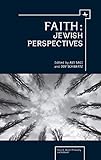Faith : Jewish Perspectives / Dov Schwartz, Avi Sagi.
Material type: TextSeries: Emunot: Jewish Philosophy and KabbalahPublisher: Boston, MA : Academic Studies Press, [2013]Copyright date: ©2013Description: 1 online resource (600 p.)Content type:
TextSeries: Emunot: Jewish Philosophy and KabbalahPublisher: Boston, MA : Academic Studies Press, [2013]Copyright date: ©2013Description: 1 online resource (600 p.)Content type: - 9781618112828
- 9781618112835
- BM729.F3 F35 2013
- online - DeGruyter
| Item type | Current library | Call number | URL | Status | Notes | Barcode | |
|---|---|---|---|---|---|---|---|
 eBook
eBook
|
Biblioteca "Angelicum" Pont. Univ. S.Tommaso d'Aquino Nuvola online | online - DeGruyter (Browse shelf(Opens below)) | Online access | Not for loan (Accesso limitato) | Accesso per gli utenti autorizzati / Access for authorized users | (dgr)9781618112835 |
Frontmatter -- Contents -- Introduction -- 1. Conceptual Analysis -- Faith as Temptation -- On Non-Illusory Faith -- On Undermining the Beliefs of Others: Religion and the Ethics of Persuasion -- Religious Belief in a Postmodern Age -- Faith in the Face of Bereavement and Loss: Coping with the Question of Evil in the World -- 2. Kabbalah and Hasidism -- Faith, Rebellion, and Heresy in the Writings of Rabbi Azriel of Gerona -- On the Essence of Faith in Hasidism: An Historical-Theoretical Perspective -- “Beyond Reason” On Faith in the Philosophy of Chabad -- Faith and Song in the Poetry of Zelda: On the Mystical Elements in Zelda’s Ars Poetica and their Hasidic Origins -- 3. Persons and Ideas -- “My desire for the living God hath constrained me”: Belief as Unfulfilled Desire in the Writings of Rabbi Judah Halevi -- The Strengthening of Faith in Orthodox Discourse: A Reevaluation of Models of Faith -- Hillel Zeitlin in Search of God: An Analysis of Zeitlin’s Meditation “The Thirst” -- A Metamorphosis in the Perception of God in Bialik’s Poetry -- Dialogue and Faith: The Lonely Man of Faith -- Unity and Fragmentation of the Self in Leibowitz’s Idea of Faith and their Repercussions: A Critical Perspective -- Index
restricted access online access with authorization star
http://purl.org/coar/access_right/c_16ec
Faith: Jewish Perspectives explores important questions in both modern and premodern Jewish philosophy regarding the idea of faith. Is believing a voluntary action, or do believers find themselves within the experience of faith against their will? Can faith be understood through other means (psychological, epistemic, and so forth), or is it only comprehensible from the inside, that is, from within the religious world? Is a subjective experience of faith fundamentally communicative, meaning that it includes intelligible and transmittable universal elements, or is it a private experience that we can point to or talk about through indirect means (poetic, lyrical, and so forth), but never fully decipher? This book presents various manifestations of the concept of faith in Judaism as a tradition engaged in a dialogue with the outside world. It will function as an opening and an invitation to an ongoing conversation with faith.
Mode of access: Internet via World Wide Web.
In English.
Description based on online resource; title from PDF title page (publisher's Web site, viewed 01. Dez 2022)


